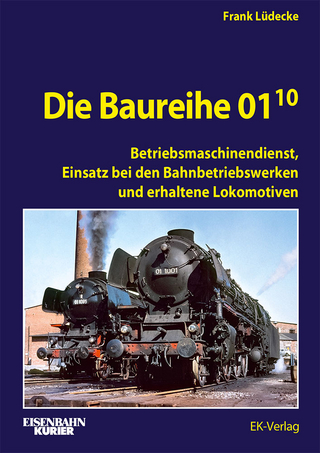
British Railways AC Electric Locomotives
A Pictorial Guide
Seiten
2017
Pen & Sword Transport (Verlag)
978-1-4738-9637-6 (ISBN)
Pen & Sword Transport (Verlag)
978-1-4738-9637-6 (ISBN)
Variety of liveries & Interesting historical information
The genesis of 25kv overhead electrification began in the late 1960s on the West Coast Main Line, the 1980s for the East Anglian Main Line, and the East Coast Main Line in the late 1980s. Development took place in stages culminating in fully electrified lines from London to Scotland on both East and West Coast lines, and from London to Norwich. The introduction of these lines required the construction of new motive power. Initially five types were produced for the WCML, from which the second phase of loco design was developed, giving a higher level of reliability, as well as power output. These newer designs were applied to the Anglian services, but the ECML plans required an updated design, ostensibly for mixed traffic, but hardly ever used on anything other than express passenger services, for which their 140mph potential enabled a major recast of the timetable. The opening of the Channel Tunnel required a mixed traffic dual voltage locomotive, running on both 25kv and the Southern Region 750v third rail DC. The locomotives are classified between 81 and 92 inclusive, and this book of photographs by David Cable covers all the classes in a variety of locations and duties.
The genesis of 25kv overhead electrification began in the late 1960s on the West Coast Main Line, the 1980s for the East Anglian Main Line, and the East Coast Main Line in the late 1980s. Development took place in stages culminating in fully electrified lines from London to Scotland on both East and West Coast lines, and from London to Norwich. The introduction of these lines required the construction of new motive power. Initially five types were produced for the WCML, from which the second phase of loco design was developed, giving a higher level of reliability, as well as power output. These newer designs were applied to the Anglian services, but the ECML plans required an updated design, ostensibly for mixed traffic, but hardly ever used on anything other than express passenger services, for which their 140mph potential enabled a major recast of the timetable. The opening of the Channel Tunnel required a mixed traffic dual voltage locomotive, running on both 25kv and the Southern Region 750v third rail DC. The locomotives are classified between 81 and 92 inclusive, and this book of photographs by David Cable covers all the classes in a variety of locations and duties.
David Cable was born in 1929, and lives in Hartley Wintney, Hampshire. He has had an interest in trains since the age of three, which developed into an interest in train photography in 1947/. David is the author of many photo albums, covering modern traction in the UK since the 1960s, as well as volumes based on his visits to the other countries over the last 40 years. He has visited countries throughout Europe, North America and Australia, as well as some Far Eastern countries and Morocco.
| Erscheinungsdatum | 22.02.2018 |
|---|---|
| Zusatzinfo | 165 colour illustrations |
| Verlagsort | Barnsley |
| Sprache | englisch |
| Maße | 250 x 240 mm |
| Themenwelt | Natur / Technik ► Fahrzeuge / Flugzeuge / Schiffe ► Schienenfahrzeuge |
| ISBN-10 | 1-4738-9637-1 / 1473896371 |
| ISBN-13 | 978-1-4738-9637-6 / 9781473896376 |
| Zustand | Neuware |
| Haben Sie eine Frage zum Produkt? |
Mehr entdecken
aus dem Bereich
aus dem Bereich
die Rhätische Bahn schreibt Geschichte
Buch | Hardcover (2023)
Edition Somedia (Verlag)
CHF 63,90
St. Moritz – Zermatt : die Traumreise im langsamsten Schnellzug der …
Buch | Hardcover (2023)
Verlag Berg & Tal
CHF 25,90
Betriebsmaschinendienst, Einsatz bei den Bahnbetriebswerken und …
Buch | Hardcover (2024)
EK-Verlag
CHF 68,90


